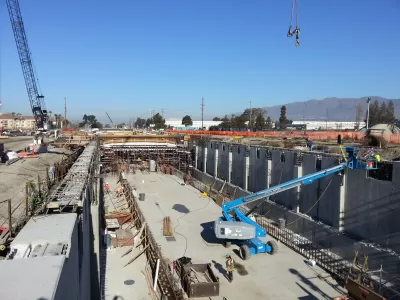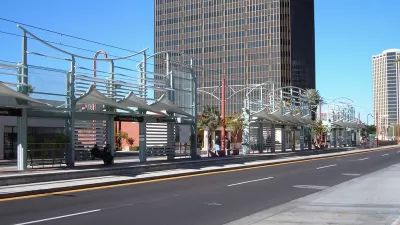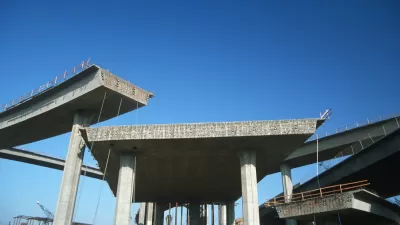Effects of the partial shutdown of the federal government differ between state highway departments and local transit agencies. Some effects aren't yet apparent, but could be soon.

Daniel C. Vock reports on the effects of the partial shutdown of the federal government on transportation departments. Effects are apparent to "thousands of workers in transportation-related agencies, including the Federal Railroad Administration and the Federal Transit Administration, as well as federal safety inspectors," according to Vock. Also, "local transit agencies are being hit harder than state highway departments." The reason for that distinction has to do with the different ways projects and operations are funded at the local and state levels (locals mostly rely on grants and states rely on the Highway Trust Fund).
Although projects relying on federal funding have been "spared from major consequences" during the shutdown, that could change due to several threats that could worsen the longer the shutdown lasts. Vock lists the reasons for that looming threat, with more detail in the source article:
- "Transit agencies won’t necessarily be able to start applying for grants to fund new construction projects once the shutdown is over."
- "Congress did not increase the amount of money it authorized to spend from the Highway Trust Fund," as planned in the 2015 FAST Act.
- "States can’t immediately access their whole year’s worth of 2019 money from the Highway Trust Fund, as they could in other years."
For an example of the kinds of delays that could potentially become much more common very soon, Vock points to the example Oklahoma, where the state is delaying contracts on 45 highway projects worth about $137 million.
FULL STORY: As Shutdown Stretches On, Transportation Officials Worry About Long-Term Effects

Maui's Vacation Rental Debate Turns Ugly
Verbal attacks, misinformation campaigns and fistfights plague a high-stakes debate to convert thousands of vacation rentals into long-term housing.

Planetizen Federal Action Tracker
A weekly monitor of how Trump’s orders and actions are impacting planners and planning in America.

In Urban Planning, AI Prompting Could be the New Design Thinking
Creativity has long been key to great urban design. What if we see AI as our new creative partner?

King County Supportive Housing Program Offers Hope for Unhoused Residents
The county is taking a ‘Housing First’ approach that prioritizes getting people into housing, then offering wraparound supportive services.

Researchers Use AI to Get Clearer Picture of US Housing
Analysts are using artificial intelligence to supercharge their research by allowing them to comb through data faster. Though these AI tools can be error prone, they save time and housing researchers are optimistic about the future.

Making Shared Micromobility More Inclusive
Cities and shared mobility system operators can do more to include people with disabilities in planning and operations, per a new report.
Urban Design for Planners 1: Software Tools
This six-course series explores essential urban design concepts using open source software and equips planners with the tools they need to participate fully in the urban design process.
Planning for Universal Design
Learn the tools for implementing Universal Design in planning regulations.
planning NEXT
Appalachian Highlands Housing Partners
Mpact (founded as Rail~Volution)
City of Camden Redevelopment Agency
City of Astoria
City of Portland
City of Laramie




























